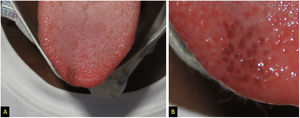A boy aged 11 years of African ancestry presented with macules in the tongue with onset 2 years prior. The patient was asymptomatic and had not experienced any trauma, was not taking any medication and had no family history of cancer. The physical examination revealed multiple brownish macules measuring 1 mm in diameter in the papillae of the tip of the tongue (Fig. 1). Hyperpigmentation was not detected elsewhere. The examination with dermoscopy evinced multiple brownish projections dividing the vessels at the base (Fig. 2). Given the location, characteristic dermoscopic findings and lack of systemic manifestations, a diagnosis of pigmented fungiform papillae of the tongue was made without need of a biopsy.1,2
Pigmented fungiform papillae of the tongue is a benign and little-known condition that is more frequent in individuals of African descent and with high phototypes.1,3 The lesions are typically located in the tip or sides of the tongue. Hyperpigmentation is exclusively found in the papillae and usually has onset in childhood and is not progressive.2 The differential diagnosis includes Addison disease, Peutz-Jeghers syndrome, black hairy tongue, melanotic macule and melanocytic naevus.1 Paediatricians and paediatric dermatologists must be aware of this condition, as it can be diagnosed based on the clinical picture, avoiding the use of invasive tests.










